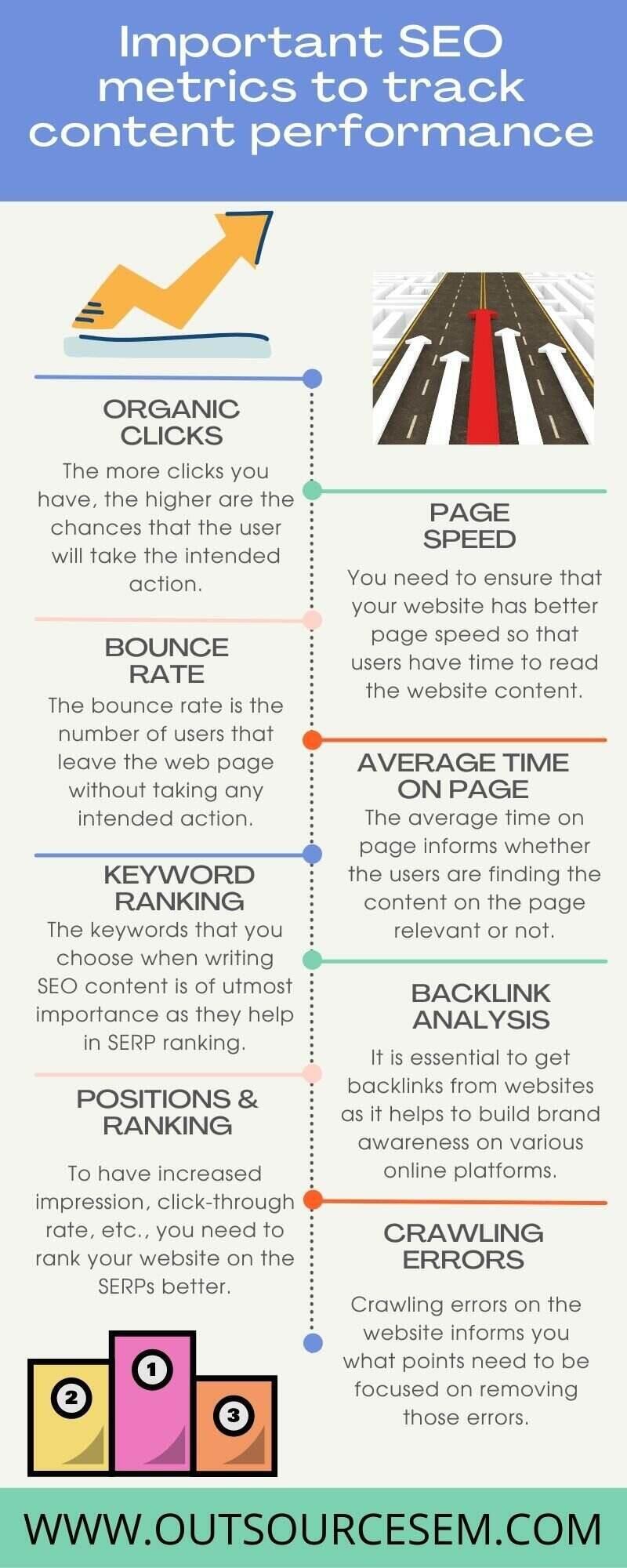When running SEO campaigns measuring the success of your marketing plan & strategy is of utmost importance. With various SEO tools, tracking website performance on the SERPs is becoming more accessible than ever. Nonetheless, one common point that businesses may still overlook is website content. Content is the first point of contact that informs the target audience about products or services that you offer. With appropriate content, you can increase traffic to the website and lure visitors into taking the intended action on the web page. In this blog, there will be discussions on various SEO metrics that you can track to improve content performance leading to better ranking on the SERPs, building brand awareness, shortening the buyer’s journey and writing great website content is vital in this regard.
The more enticing website content begets more conversions, boosts average time on page and much more. Any form of digital marketing like running PPC ads, search engine optimization techniques, marketing in the metaverse, social media marketing, etc., the content will always have its presence. We witnessed digital marketing during the Coronavirus pandemic had a completely different impact and with an adequate content marketing strategy, many businesses saw an increase in impression share, boost click through-rate, etc.
We focus on writing engaging ad copies in Facebook Ads, YouTube Ads, LinkedIn Ads, etc., to make the users click on the ad. In the same way, you should focus on writing eye-catching meta descriptions so that the users choose your website for relevant keywords or search terms entered. As you conduct an SEO audit and prepare a data-driven SEO report to optimize various metrics in achieving the desired marketing goals. Similarly, you must focus on updating your website content with the latest SEO trends to increase users’ trust and be ahead of your competitors. Let us see how tracking some of the essential SEO metrics mentioned below could help you write content that connects customer touchpoints, increases lead generation and makes visitors stay longer on your website.
Important SEO metrics to track content performance

1. Organic clicks - In your SEO content writing strategy, you need to monitor how many organic clicks your website receives. You need to analyze the search traffic data that tells you how much traffic you get from various online platforms, social media platforms and search queries entered by the user on a search engine.
The more clicks you have, the higher are the chances that the user will take the intended action. You should focus on the point that the more impressions you receive, you have more chances to make the users click on your website. This can be done with the help of eye-catching product descriptions on the SERPs and the content on the website. After analyzing the number of organic clicks on your website, you can make informed decisions moving forward. The organic clicks data help you to have an insight into the user activity and gives you a brief idea about what the users are thinking about your website and what necessary steps need to be taken to improve the ranking and position of the website. Some points that you can focus on to enhance organic clicks to your website are discussed below.
a. Perform keyword research.
b. Fix keyword cannibalization (if any).
c. Use creative titles.
d. Descriptive URL structure and headings.

2. Page speed - In this digital era, you have the most impatient users. Nearly 40 % of users leave a website that takes more than 3 seconds to load. So, you need to ensure that your website has a good page loading speed so that the users do not have to wait long for the products or services they are looking for. However, you need to understand that page and site speed is not the same concept. Site speed is the page speed for multiple pages on a website, whereas page speed is the page load speed of a particular page.
It can clearly be understood that better page speed results in a better user experience. In your content strategy, you need to ensure that your website has a better page speed so that the users have appropriate time to read the website content. Google also rewards this as a ranking factor as websites with better page speed have better rankings on the SERPs.
No matter how engaging content you write or have great product page descriptions, you need to ensure that the page loads in quick time. This would keep the interest of the user engaged. A lower page speed also indicates that the search engine can crawl fewer pages in a given time. As you avoid duplicate content and focus on writing unique content in the same way, you need to have display URLs that are unique and show the users where they are being redirected after clicking on your website. To check the page speed, you can use tools such as PageSpeed Insights, Google Lighthouse, etc.
3. Bounce rate - Another point to focus on is tracking bounce rate when tracking SEO metrics to check the content performance. The bounce rate of any website is the number of users that leave the web page without taking any intended action. In your content strategy, it is essential to track bounce rate as it helps to know the percentage of users that do not like the content on the page.
Tracking bounce rate is crucial in search engine optimization as not all the organic clicks on the website lead to the intended action. With this SEO metric, you can work on performing remarketing after you know the number of users that do not navigate through different sections on the website or do not take any intended action on the particular web page. The remarketing can be performed with email marketing, content marketing, etc. A content specialist can be of great help in this regard. They can write the content based on users’ interests so that when they receive mails or messages, they feel that the message is drafted especially for them. Some of the points to focus on in SEO content writing to lower the bounce rate are discussed below.
a. Make your website more responsive.
b. Perform a/b testing.
c. Use video and images to capture users’ attention.
d. Improve page loading speed.

4. Average time on page - To track your website's content performance, another SEO metric to track is the average time on page. The average time on page informs the advertisers whether the users are finding the content on the page engaging and relevant or not. The average time on page is the amount of time users spend on a page in a single day. This informs you whether major modifications are required on the webpage or not.
Not every time when the low average time on the page means that the user is not engaged. There are myths regarding SEO advertising. You need to focus on the fact that you do not have users already engaged with your website. So, these users do not spend much time believing that the product or services they are availing of are trustworthy. These users come to your website, choose their product or services and take the intended action. With the help of Google Analytics, you can determine the average time on the page. With an attribution report, you can track where your users' coming from and users from which platform stays longer on the page. You can then focus on targeting users of this platform to improve the average time on the page as they have high chances of taking the intended action.

5. Keyword ranking - The keyword ranking is essential to track the content performance. Search engine optimization focuses on using relevant high-traffic keywords. The keywords may be in the form of terms or phrases. The keywords that you choose when writing SEO content is of utmost importance as these are the terms entered by the user.
You can conduct SEO keyword research to determine what terms to be used in your website. In your SEO content writing strategy, you need to choose the terms with high traffic. You can consider starting with a seed keyword and then taking keyword ideas from the result displayed. You can also perform competitor analysis and determine what keywords they are using in their website for similar products or services.
The keyword ranking is also essential as it helps to know for which keywords your website is ranking. It also identifies particular pages that are ranking for any keywords. In your content strategy, you need to include keywords in titles H1 and H2, meta description, etc. However, you need to ensure that there is not too much keyword stuffing. Some points to focus on having a better keyword ranking are mentioned below.
a. Improve page tagging ( like using keywords in page titles, headlines, etc.)
b. Build a structure with internal links.
c. Updating content with relevant keywords.

6. Backlink analysis - Backlinks are links that your website gets from other websites. A well-written content lures users from another website to make a click on your offerings. The website also lists your business if they find your product or services are legitimate. With a data-driven report from Google Analytics, you can figure out the number of backlinks that you receive. You can then analyze the content performance to get more backlinks in your content strategy. Search engines find new content by revisiting pages. If any website provides links to your website for the search query, then the search engine improves your ranking on the SERP as they may revisit the content faster if you get backlinks from popular pages or websites.
It is essential to get backlinks from different websites as it helps to build brand awareness on social media platforms, increase traffic to your website, etc. The more backlinks you get from relevant websites, the more users get to know about your business. It also entails a point that the content on the website is updated regularly and is in sync with the latest marketing trends. Some points to focus on to improve backlinks to your website are discussed below.
a. Get backlink with referrals.
b. Use outbound links from partner websites.
c. Craete high-quality links that is trustworthy so that others give link to your website.
d. Use relevant keywords.
e. Fix broken links ( if any).
f. Write guest posts.
7. Positions and ranking - The next important SEO metric to track content performance is the positions and ranking of your website. To have an increased impression share, enhanced organic click-through rate, increased number of users to the website, etc., you need to rank your website on the SERPs better.
In your SEO content writing strategy, you need to focus on having great content on your website that lures the visitors to take the intended action. Google’s algorithm and ranking factor keep updating, so you need to focus on user-generated content(UGC). The user-generated content may be images, videos, etc. You should consider optimizing images and including short, engaging videos to make the target audience choose your website for keywords or search terms entered related to your business.
The positions and ranking on the search engines like Google and Bing keep changing. So, you need to keep updating your content with the latest marketing trends to increase the users’ trust in your website. You should consider having content that resonates with the user's intent. Suppose you have an e-commerce website. In that case, you need to focus on e-commerce trends and then update your e-commerce website content accordingly. You can conduct e-commerce keyword research to choose the relevant keywords that drive traffic to your website. You can also perform e-commerce remarketing to get in touch with users who just did window shopping but did not take the intended action.
The website's position keeps changing on the SERPs, so you need to ensure that your website ranks on the first page. The top position website on the first page of Google gets nearly 25% of clicks. So, you must focus that your website appears on the first page of Google. The website's position can be anywhere on the first page, second page, etc. You can consider performing an SEO audit to highlight the critical points that need to be optimized, like organic click-through rate (CTR), pages per session, conversion rate, etc., to improve the ranking and position of the website on the SERPs. You can consider some points while SEO content writing to enhance ranking discussed below.
a. Optimize your website for mobile devices.
b. Avoid duplicate content and keep updating the website regularly.
c. Use alt tags.
d. Redirects like 301 and 302 redirects.
e. Focus on link-building.

8. Crawling errors - Another crucial SEO metric to track content performance is crawling errors. The website content needs to be updated regularly and duplicate content(if any) present on the website needs to be avoided. Crawling errors on the website informs you what points need to be focused on removing those errors. These may include the page not getting redirected to the relevant web page, errors such as 301 and 302, image alt text are missing, etc.
Site errors are common like DNS server errors are present. The errors occur when a search engine bot attempts to crawl a URL but cannot do so. It may also happen that the URL path is not defined correctly. In search engine optimization, you need to focus on the point that your website is crawled and indexed properly. This would help the search engines like Google to display the relevant result for search terms or queries related to your business. You need to ensure that you clearly define alternate image texts for images that do not load properly. With the launch of mobile-first indexing, you need to optimize your website for mobile devices as it gives an added advantage in SERP ranking. So, you must consider optimizing your website content for mobile devices. You can use Google Search Console and Screaming Frog to crawl your website.
Why track content performance?
Google’s search algorithm and ranking factor always keep updating. Multiple results are displayed after entering a keyword or search term in the search engine. The users then choose the website they are familiar with or whose meta description they find more appealing. So, brands like Amazon that already have a huge user base do not have to strive hard to rank on the SERPs. But, for businesses that are comparatively new or have fewer users choosing their website, they have to work on multiple steps to improve the SEO performance of their website.
The brands that established a name keep tracking the content performance on a regular basis. So, to compete with such brands, apart from tracking various SEO metrics, you also need to analyze how the content on the website is performing. You need to figure out the ranking & position and determine that the product description or service offerings have great website content that lures the user to take the intended action. You need to ensure that the product description makes the user move ahead on the website. Some of the points why need to analyze various SEO metrics to track content performance are discussed below.
a. Generate more leads - With the increasing number of websites, the competition in every digital marketing sector gets more intense. This makes digital advertisers focus more on content marketing strategies to increase visitors to the website. A well-written content makes your website be ahead of many others in the same field. In your SEO content writing strategy, you need to focus on writing organized content and write lucidly so that the user takes the intended action after navigating through different sections on the website. In your content marketing strategy, you should focus on the point that your content easily conveys your business message to the target audience.
The website content should not have words that are way too hard for users to understand. You should include words that make the target audience know what you are willing to say. The website content should engage the target audience to make them stay on the web page longer. The more time they spend on the webpage, the higher the chances they will take the intended action. E-commerce PPC focuses on e-commerce trends and then the content specialist strategizes to write ad copies. In the same way, in your content strategy, you should ensure that you have updated content so that the users know that your product or services are in sync with the marketing trends. With the help of a content specialist, you can have quality website content as they have the mastery to avoid duplicate content, which helps in lead generation, lowers the bounce rate, increases website ranking on the SERPs and much more.

b. Improve social media engagement rate - Another benefit of tracking the performance of SEO metrics is that you can improve the social media engagement rate. The social media platform is a place for like-minded people. With the increasing number of users on online platforms, you have to target a vast number of users. In your content strategy, you should focus on interest category marketing, go-to marketing strategy, etc. and then write your website content accordingly.
The social media platforms offer the option of writing website content focusing on the buyer persona. You can be a bit more friendly and write engaging social media posts, including reels and stories, etc. As these platforms have users with the same goal orientation, even if a single user finds your content engaging, they would reach your website. After availing of your product or services, the more engaged the user is, the more likely they are to promote it to their friends and family, thus leading to peer-to-peer marketing.

c. Earn quality links - Your SEO content writing strategy focuses on having content that defines your business offerings and conveys your business message to the target audience. When you find users coming to your web page from different websites, it signifies that the other website finds your web content authentic. This helps in link building as the more quality backlinks you get, your website’s online presence in the online world-scale high. The more relevant backlinks you get, the more the users’ trust with your website increases and helps in affiliate marketing. When you track the performance of various SEO metrics in your content strategy, you should ensure that you do not get links from black hat websites, as this may lead to search engines penalizing your website.
d. Increase users trust in your website - Having great content on your website not only improves the visibility on the SERPs but also increases the users’ trust. As the digital marketing world keeps evolving, you must focus on the point that your website is constantly updated with relevant content.
In your SEO content writing strategy, you can work on how-to-content that persuades the user to engage more users with your brand. The content on the website is not updated daily and thus lasts for a certain period till any update is performed. Updated content on the website makes the users have a belief that the company thinks from the users' perspective. It means that the users can view them anytime. Thus, great content grabs users’ attention and increases the chances of the user to take the intended action.
Businesses today use multiple online platforms to get in touch with the target audience. So, you must focus on having a building a strong online presence. With excellent website content, the more users trust your brand name, the more likely they will have a positive response about your business when discussing with friends and family, thus helping in peer-to-peer marketing.
In your e-commerce content marketing, you need to focus on including e-commerce trends in your website content. To increase users' trust as you focus on ad relevancy in pay-per-click advertising, you need to have website content relevant to the description shown on the search engine result page. You should also focus on the proper organization of your website content so that the user navigation on the website is easy, leading to an increase in conversion rate.
Closing thoughts
To boost your website SEO performance, one crucial point you need to focus on is tracking content performance. The various SEO metrics help analyze how your website is performing and what essential steps need to be taken to achieve the desired goals. Measuring and evaluating your efforts on SEO content writing gives you an insight into the target audience. As in PPC ads, you need to ensure that your ads are optimized for mobile devices; similarly, you need to ensure that your website is optimized for mobile devices.
You need to optimize images, page titles, etc., for mobile devices so that the content size appears as per the device on which it is being accessed and is not hazy or blurred. If tracking content performance is complex, you can get in touch with a digital marketing company. The professionals have expertise in content marketing, email marketing, reputation management, go-to-market strategy, performing website conversion analysis, etc. The content specialist helps organize the most appealing content to the target audience and helps you to skyrocket your desired marketing goals. With the help of our white label SEO services , you may attract more clients with the ideal fusion of technical and marketing expertise. You'll have access to a group of professionals at our white label SEO company who are prepared to provide your business the direction it needs! We'll give you an advantage over the opposition. As well as if you are running a business or in any industry, such as electrical services, flooring, roofing, lawyer services, or small businesses, we can assist you with all your SEO needs. Our exceptional SEO services, including electrician SEO, flooring SEO , roofing SEO, lawyer SEO, and small business SEO services, can help your business thrive online.
Reference
• Content marketing metrics: 4 key groups to measure your content performance
• Top 13 SEO metrics to track content performance & engagement
